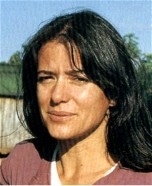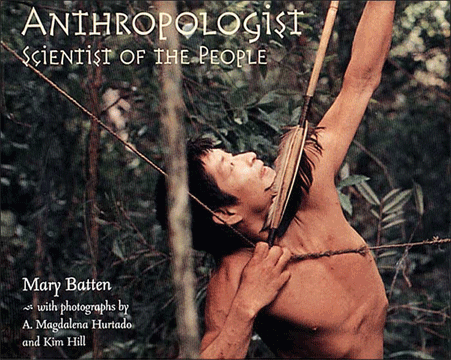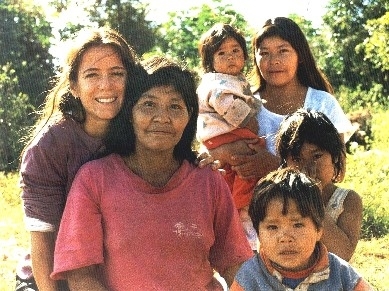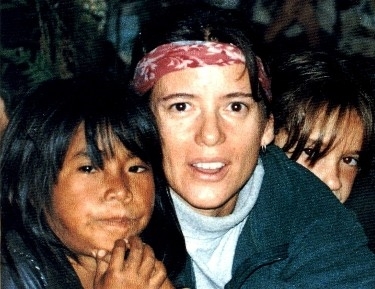 |
It isn't often that you get to meet your heroes, but as a writer, I had the opportunity to meet one of mine and write a book about her. She is Magdalena Hurtado, an anthropologist who has spent many years studying the Ache, a group of hunter-gatherers who live in the South American country of Paraguay. It was a privilege to get to know Magdalena and to share her friendship, trust, and close collaboration in the many hours of interviews that went into producing our book, Anthropologist: Scientist of the People.
Magdalena has all the qualities that make a person a good scientist. She is curious about everything. She is a keen observer, and she loves people and learning about different cultures. Her fascination with different kinds of people began with her family. She spent her childhood in Caracas, Venezuela. Her mother was a medical doctor from Colombia, and her father was from southern France. Her mother took her to every anthropological museum and exhibit in her community. Sometimes, she took Magdalena when she went into the rural coffee-growing areas to provide free medical care to the peasants, who lived in great poverty. Those visits made a lasting impression on Magdalena. She saw babies dying and people suffering from horrible wounds. She watched how her mother showed respect and compassion for her patients.
 |
Sometimes Magdalena’s mother went on expeditions with scientists to remote areas where she met indigenous people – native people who originated in a particular region. She returned home with handmade baskets, tools, and other artifacts that Magdalena found both strange and beautiful. She was also impressed by the beautiful photographs that her father had taken of the Cuna Indians when he worked for the Panamanian government in the early 1940s. “I had the idea that anthropology was just the coolest thing to do,” Magdalena says. “My mother and father had such admiration for people of different cultures.”
Magdalena’s parents taught her that it was important to be a citizen of the world. They also taught her one of a scientist's basic skills: asking questions. Questioning everything has been the theme of my whole life," Magdalena says. I started out asking questions about alot of things . I had to ask questions about everything I was ever taught. I wanted to know, Is there anything universal about what you are teaching me? I didn't call it anthropology; it was just a personal quest."
 |
Magdalena’s quest led her to become an anthropologist. She is the kind of anthropologist called a human evolutionary ecologist. She uses the science of evolutionary biology to study people, just as biologists use this same science to study animals. Evolutionary biology teaches that all animals, including people, do whatever is necessary in a particular environment to survive, mate, and bear healthy offspring that will in turn survive, mate, and reproduce. Although individuals in different animal species and in different human societies have various ways of doing these things, they are all trying to survive and reproduce successfully.
Anthropologists like Magdalena ask “why” questions. Why do people spend as much time foraging as they do? Why do they like to eat some animals and plants but not others? Why is finding a mate so important? Why do people care more for some sick individuals than others? Why do people in hunter-gatherer societies share more food than do members of other societies?
During her many years working with the Ache, Magdalena has been particularly interested in women’s lives and the differences between men’s and women’s work. The difference that interested her the most was why men hunt and women gather. Most indigenous societies have this sexual division of labor. But why? How did this division evolve? From her studies, Magdalena has learned that women who are nursing a baby spend less time foraging than do women without a baby. From her observations of Ache women, Magdalena has proposed an important hypothesis. She suggests that the sexual division of labor in the human species may have evolved when females ignored opportunities for hunting animals because doing so would reduce both the time women could spend mothering and the quality of that mothering. Reduced mothering would result in higher death rates of children. Magdalena is the first anthropologist who gathered a great deal of data on extant hunter-gatherers to indirectly test these hypotheses. If other scientists accept Magdalena’s conclusions, she will have greatly expanded our understanding of our species.
 |
Magdalena and her husband Kim Hill, who is also an anthropologist, have worked together on a study of the Ache’s foraging behavior. They weighed every item of food, no matter how large or small, brought into camp. They learned that the people are very selective when they hunt and gather. They go after animals, such as monkey, paca, armadillo, deer and peccary, or plant products like palm fruit that provide the most calories for each hour they forage. From the data they collected, Magdalena, Kim, and their colleagues learned that the Ache eat very well, as much as 2,700 calories per person per day. This is more than many active American adults eat per day!
The Ache, like all hunter-gatherers, are important because they are the last living clue to the ancient past of all people on Earth today. By studying the Ache, Magdalena is learning more about all of us. But the Ache are now facing a difficult and uncertain future. They are caught in an incredibly complex transition between the Stone Age and the Space Age. Magdalena and Kim are working as hard as they can to help the Ache make this transition from hunting and gathering to a farming lifestyle. In a few decades, these people are trying to make changes that took our ancestors many thousands of years to make. In the process, their diet has become less varied and they are suffering from malnutrition. Their muscles are growing weak from lack of physical exercise. And the birth rate is increasing. A more sedentary lifestyle on a reservation has also brought sanitation problems with resulting diarrhea and other intestinal diseases. “It’s a public health problem that I’ll probably be working on for the rest of my life,” Magdalena says. She is bringing in a team of medical researchers to train health-care workers and set up clinics for the people.
After many years of studying the Ache, Magdalena and Kim feel a great debt of gratitude to the people for accepting them into their community and enabling them to do field studies. Now they want to give back as much as they can. She and Kim have set up a foundation called the Native Peoples and Tropical Conservation Fund. For those who argue that anthropologists should leave hunter-gatherers in a pristine environment, Magdalena points out that the moment contact with outsiders is made, there is no longer any pristine environment. When hunter-gatherers make contact, they become part of an international community that recognizes basic human rights, such as freedom and good health. Magdalena feels it would be irresponsible and unethical not to help the Ache become aware that they have rights. "If we have the know-how and the ability, we have to do something," she says. "We do make a difference."
The key, Magdalena believes, is educating people to understand how biology and ecology influence all our lives. With understanding, people can give up our fear of differences and develop trust. We can reach out and care for one another as members of the same human species.
Page created on 8/16/2014 6:43:55 PM
Last edited 1/9/2017 10:37:12 PM
Batten, Mary. Anthropologist: Scientist of the People. Boston: Houghton Mifflin, 2001. 64
Kim Hill, A. Magdalena Hurtado. Ache Life History: The Ecology and Demography of a Foraging People. New York: Aldine de Gruyter, 1996. 561
